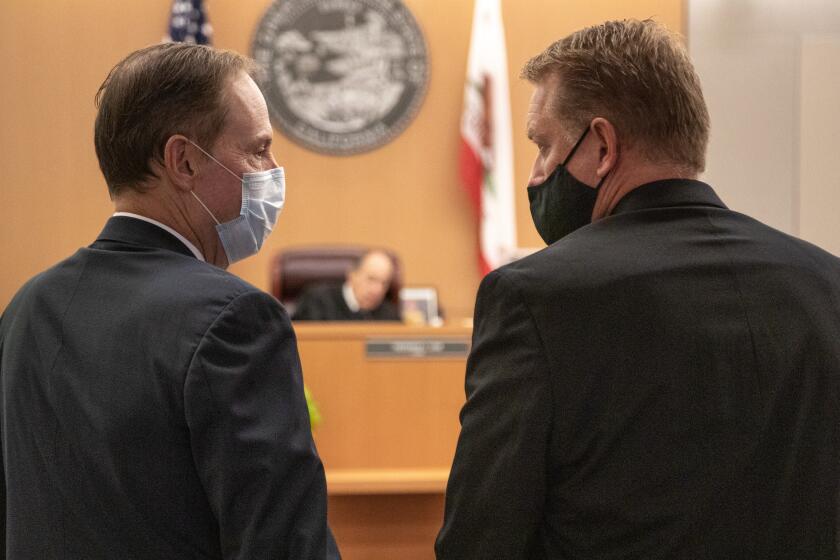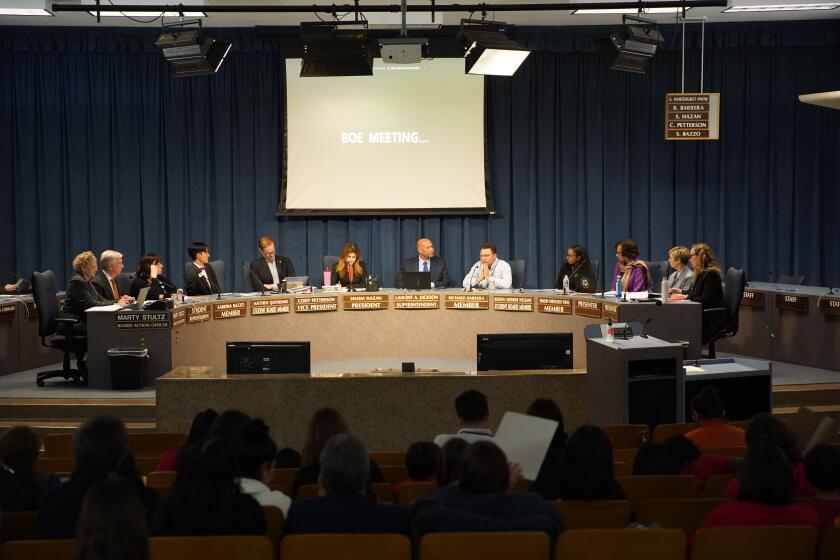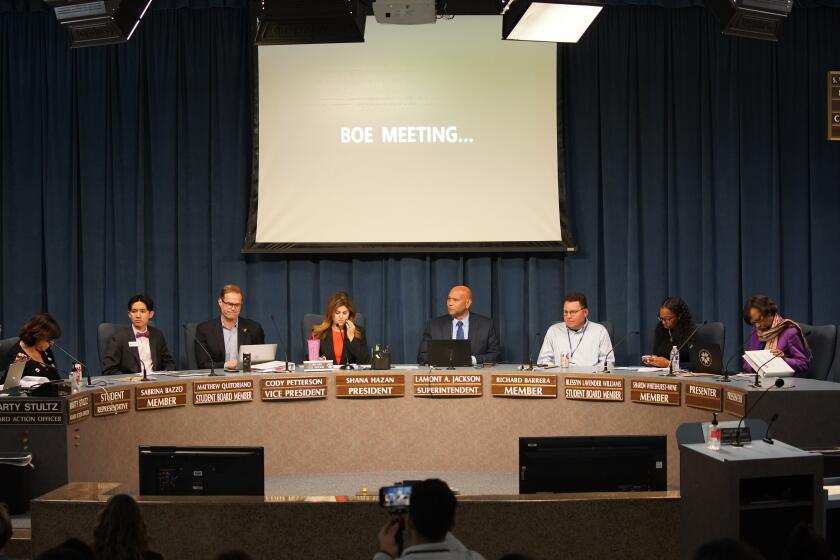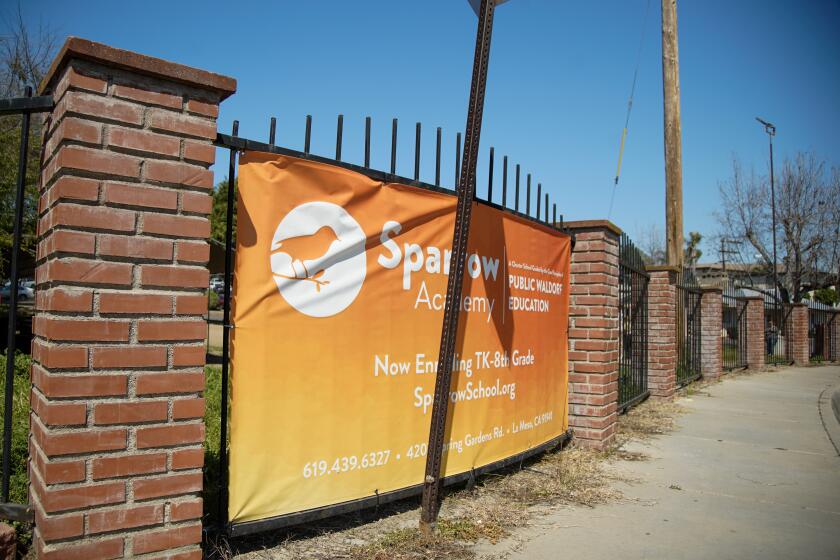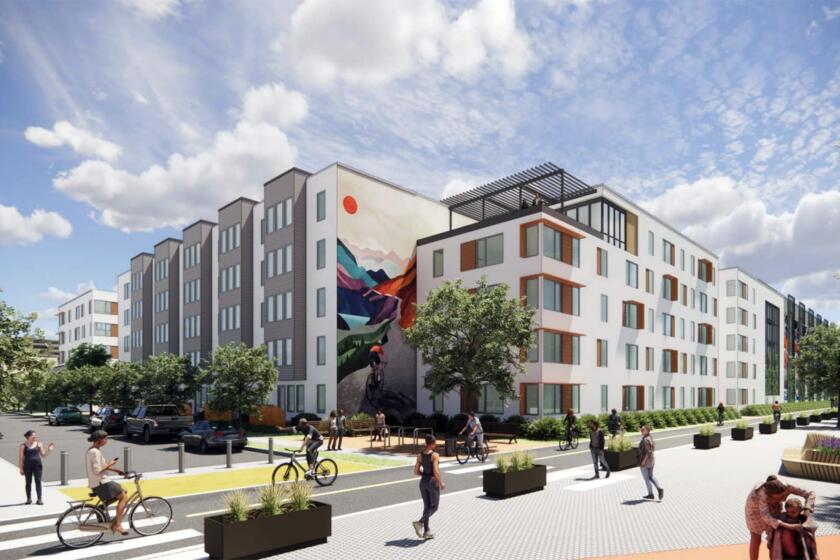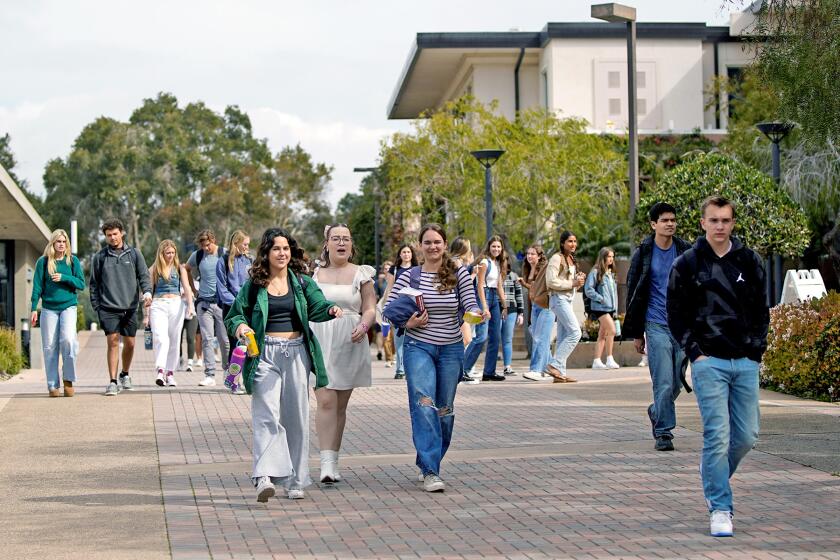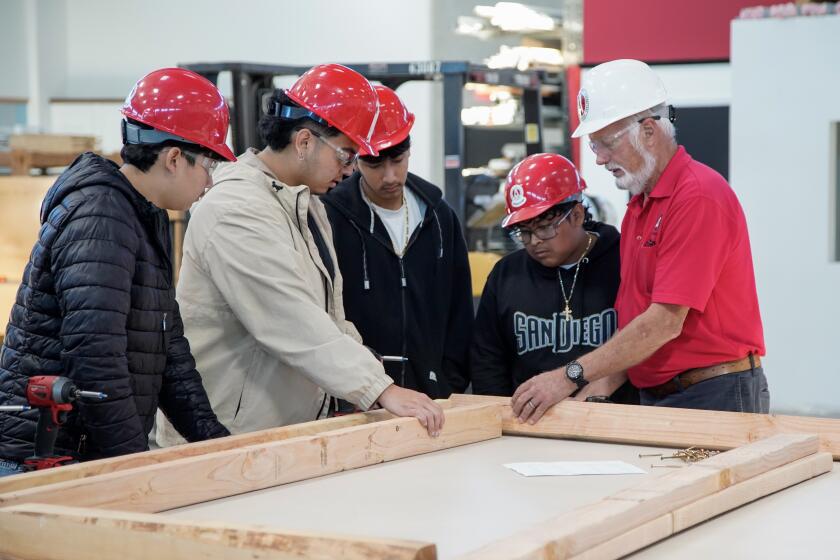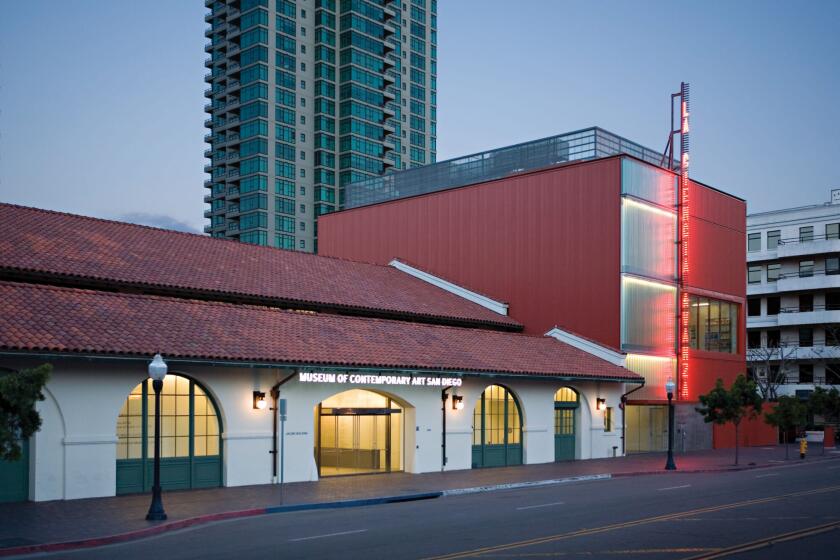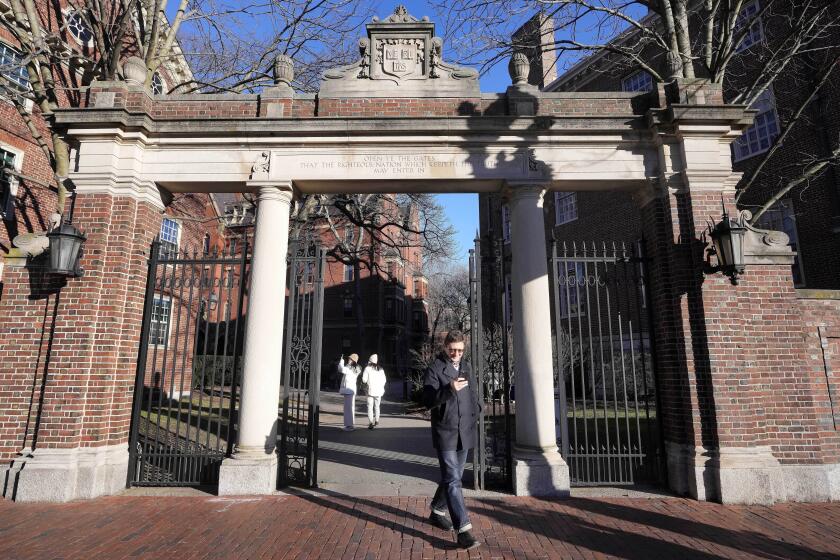San Dieguito superintendent’s comments about Asian students draw backlash, apology
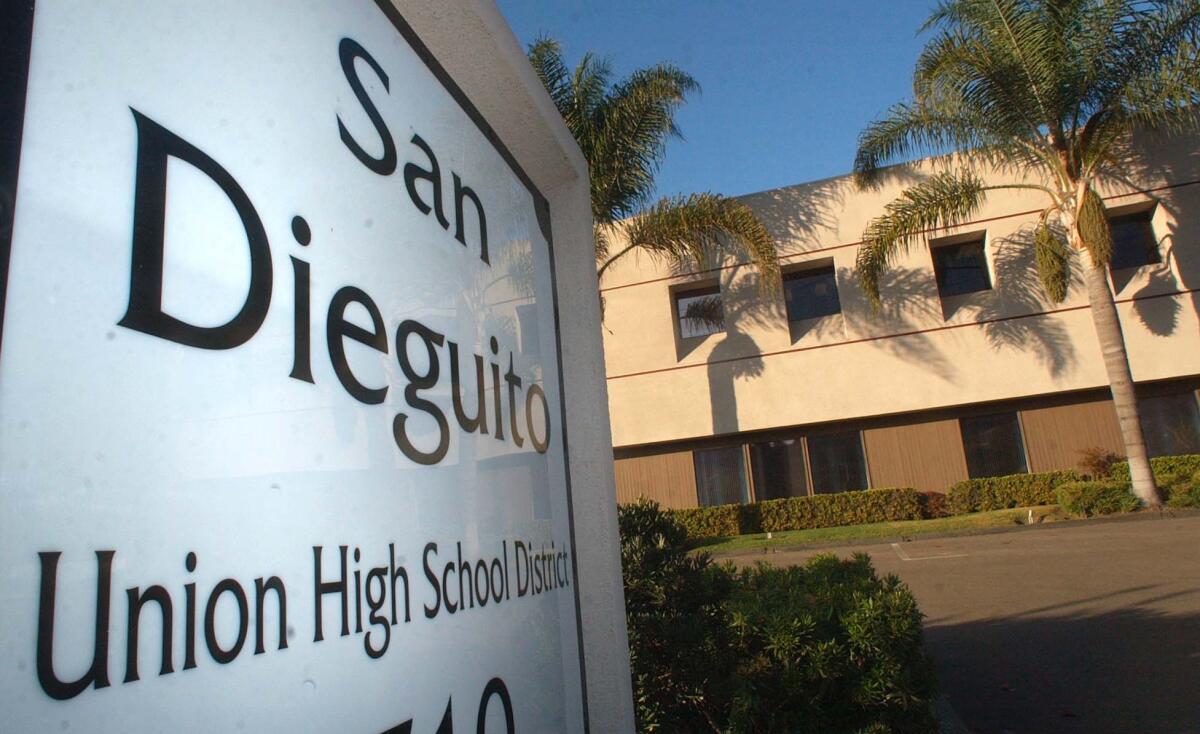
Superintendent apologizes after she said Asians do well because they are wealthy families who come from China
During a San Dieguito Union High School board training workshop Monday about diversity, equity and inclusion, Board Trustee Michael Allman asked the workshop moderators a question: “Do we know why Asian students do so well in school?”
He was asking about district data that showed that several groups of Asian students in the district — Asian Indian, Korean, Vietnamese, Japanese and Chinese students — receive fewer D and F grades than other racial groups.
For the record:
4:53 p.m. April 29, 2022This story was changed to clarify that Michael Allman has said he was addressing the workshop moderators with his question about Asian student performance, not Cheryl James-Ward.
Superintendent Cheryl James-Ward told Allman she knows part of the reason: It’s because wealthy families have been moving into San Dieguito from China.
“We have an influx of Asians from China, and the people who are able to make that journey are wealthy. You cannot come to America and buy a house for $2 million unless you have money,” James-Ward said.
James-Ward, who is Afro-Latina, added: “In my community, in Carmel Valley ... we had a large influx of Chinese families moving in, sight unseen, into our homes, into the community, and that requires money.”

Chinese families, James-Ward said, have parents and grandparents at home to support their children. Meanwhile, James-Ward said, some Latino families “don’t have that type of money” that Chinese families have, and they have parents who are too busy working to help their children at home.
Within hours James-Ward’s comments drew criticism from some who said they reinforce model-minority stereotypes of Asians, who make up 17 percent of San Dieguito’s enrollment, as all being high-achieving and high-income. The day after the board meeting, an unidentified user posted on YouTube a three-minute video of James-Ward’s comments about Asian students. The video received more than 2,800 views in one day.
A San Diego organization that has opposed affirmative action and criticized school ethnic studies programs as being racially divisive condemned James-Ward’s comments on Tuesday, saying they constitute “inflammatory bigotry” and that they stereotype Asians.
“Dr. Ward’s comments were deeply offensive, grossly inaccurate and intentionally divisive, which ill-fits her leadership role in a major school district,” the organization Californians for Equal Rights Foundation, whose president and executive director are Chinese-American, said in a statement.
In an interview, James-Ward accused whoever published the video of taking her comments out of context and causing “this firestorm” in order to smear her. She said she doesn’t know who posted the video, but she suspects it has something to do with backlash she has received over San Dieguito’s recent redistricting dispute and a complaint she recently filed against Allman. She declined to describe the allegations in the complaint.
“We have this person trying to play at the heartstrings of our community, to divide the community, to harm me. That’s what this is about,” James-Ward said of the person who posted the video. “To take what I said so out of context and put that little thing there is wrong to the core.”
San Dieguito has been in chaos for months as the board’s conservative members, including Allman and Board President Maureen Muir, have clashed with the board’s liberal members and James-Ward over issues including redistricting. Allman could not be immediately reached for comment.
Later in her interview, James-Ward said she “probably should’ve been a little more careful and thoughtful in my words.” She said what she meant is that students are successful when they have the so-called “four capitals” — emotional, financial, educational and social capital.
“I should’ve said it differently, right, because the issue is very complex,” she said. “I should’ve just left it at ‘complex.’”
After finishing her interview, James-Ward called a reporter back to say she apologizes if her words hurt anybody in San Dieguito.
“If I harmed any member of my community, I am deeply sorry, and that would never be my intent,” she said.
San Dieguito, which has 12,700 middle and high school students, is overall a largely wealthy district, with a median household income upwards of $135,000 and fewer low-income families than other school districts.
About 12 percent of San Dieguito’s Asian students are socioeconomically disadvantaged, compared to 19 percent of San Dieguito students overall, according to state data. A higher share of Latino students are socioeconomically disadvantaged, at 44 percent, but most Latino students in the district, 56 percent, are not socioeconomically disadvantaged.
People need to be careful when talking about Asian students having higher performance than other groups because it can reinforce what has been a historical pattern of scapegoating Asians for problems other communities are facing, said Samuel Museus, an education professor at UC San Diego who has written about race, equity and Asian-American studies. The most recent obvious example of this is how Asians and Asian-Americans have been targeted for violent hate crimes because of COVID-19, Museus said.
This kind of scapegoating, Museus said, leads groups to compete with each other for resources rather than doing what should be done: scrutinizing how the education system provides resources and opportunities to some groups and denies them to others.
Characterizing all Asian students as high-performing and well-off also obscures the diversity of groups within Asian-American communities and the fact that some Asian-Americans are disadvantaged and low-performing, Museus said. Not all Asians are from China or are of Chinese descent, and not all Asian students are from high-income families, he said.
The issue is complicated by the fact that many people aren’t well-versed in how to talk about Asian and Asian-American communities in the context of racial equity because of this model minority myth, Museus said.
“Because of the stereotype and the very simplistic data that people use over and over and reinforces those stereotypes, oftentimes we don’t think we need to include Asian-Americans in this conversation unless it’s about why they’re succeeding so well,” Museus said. “So all of these complexities, these racial complexities, are not well understood and people don’t know how to talk about it.”
Museus said James-Ward’s language about Chinese families moving into Carmel Valley “sight unseen, into our homes,” appeared to reinforce a common “othering” of Asians and Asian-Americans. He said that kind of language has fueled scapegoating of Asian and Asian-American communities in the U.S. throughout history.
“It’s differentiating the Asian immigrant that’s an outsider from those of us in the community who own these homes,” Museus said.
James-Ward was planning to hold a town hall on Thursday evening with Melisse Mossy, a former board trustee who announced her resignation this week, where members of the public could ask questions about the district. On Wednesday afternoon the district announced that the town hall had been canceled.
Updates
9:11 a.m. April 25, 2022: This story was updated to clarify that many but not all of Californians for Equal Rights Foundation’s leaders are Chinese-American. The group’s president, executive director and multiple board members are Chinese-American.
Get Essential San Diego, weekday mornings
Get top headlines from the Union-Tribune in your inbox weekday mornings, including top news, local, sports, business, entertainment and opinion.
You may occasionally receive promotional content from the San Diego Union-Tribune.


